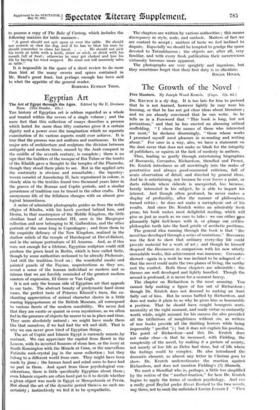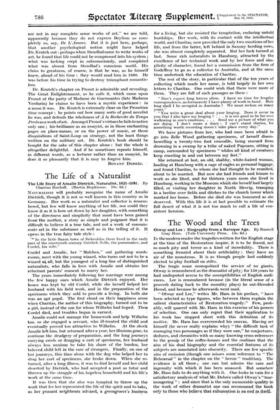The Growth of the Novel
Five Masters. By Joseph Wood Krutch. (Cape. 12s. 6d.) PR. KRUTCH is a sly dog. It is too late for him to pretend that he is not learned, however lightly he may wear his
learning, or that he has not got clear ideas about literature ; and we are already convinced that he can write. So he tells us in a Foreword that " This book is long, but not pretentious," and that he has erected no alarming critical scaffolding. " I chose the names of those who interested me most," he declares disarmingly, " those whose works I promised myself most pleasure in re-reading and writing about." For once in a way, also, we have a statement on the dust cover. that does not make us blush for the integrity of publishers, or squirm at the lack of modesty in authors.
Thus, leading us gently through entertaining biographies of Boccaccio, Cervantes, Richardson, Stendhal and Proust, Dr. Krutch introduces us all unwittingly into the realm of penetrative and always good-mannered criticism, full of
acute observation of detail,- and "directed by general ideas.
And he is entertaining, not because he ever forces a point, or darts ridicule where ridicule is unexpected, but because, keenly interested in his subject, he is able to impart his interest. And though often profound, he never makes a display of profundity, after the manner of philosophers
turned critics ; he does not make a metaphysic out of his results. And since Dr. Krutch writes an admirably fresh prose, his book makes most delightful reading, which will give us just as much as we care to take : we can either pleasantly light -half-hours with it, or plunge our philosophic teeth into the hard gristle of aesthetic problems. The general idea running through the book is -that " the novel has developed through a series of mutations." Boccaccio
was the first to show that ordinary every-day life could
provide material for a work of art ; and though he himself despised the Decameron in comparison with his now utterly
-unreadable works, this achievement was immense. Cervantes showed—again in a work he was inclined to be ashajned of— that the novel could unite the two planes of living, the earthy and the exalted. Both these chapters are admirable : the themes are well developed and lightly handled. Though the second is profound, it is never for a moment heavy.
The chapter on Richardson is the most amusing. You cannot help making a figure of fun out of Richardson ; though Dr. Krutch does not descend to making an Aunt
Sally out of him. But he seems baffled by Richardson, and does not make it plain to us why he gives him so honourable a position. That he should have caught bourgeois senti-
mentality at the right moment, and made virtue so eminently worth while, might account for his success (he also provided all the titillations of naughtiness without sin, as writers of war books provide 'all the thrilling horrors while being impeccably " pacifist ") ; but it does not explain his position.
The point of Richardson—and this Dr. Krutch does not make clear—is that he increased, with Fielding, the complexity- of the novel, by making it a picture of society,
not merely of low life as Defoe had done, but of life where the feelings could be complex. He also introduced the dramatic element, as almost any letter in Clarissa goes to show. Dr. Krutch underestimates the reaction against Richardson, and does not mention Fielding's (?) Shamel% We meet a Stendhal who is, perhaps, a little too simplified by the notion of the " mother-fixation," for here Dr. Krutch begins to apply the terms of modern psychology. And can a really good Beylist prefer Henri Brulard to the two novels, nay three, not to omit the unfinished Lucien Lemma ? " They are not in any complete sense works of art," we are told, apparently because they do not express Beylism so corn- pletely as, say, De L'Amour. But it is just here, perhaps;
that another psychological notion might have helped Dr. Krutch out : perhaps when Stendhal came to write works of art, he found that life could not be compressed into his system ; what was lacking crept in subconsciously, and completed what was absent from Stendhal's conscious world. His claim to greatness, of course, is that he was, as he himself knew, ahead of his time : they would read him in 1880. He was before his time in trying to destroy triumphant romantic- ism.
Dr. Krutch's chapter on Proust is admirable and revealing. The Great Enlightenment, as he calls it, which came upon Proust at the party of Madame de Guermantes• (late Madame Verdurin) he claims to have been a mystic experience : in a sense it was. Dr. Krutch is extremely clear on the Proustian time concept : he points out how many sorts of good novelist he was, and defends the wholeness of A la Recherche du Temps Perdu as a work of art. Amongst Proust's virtues he fails to notice only one ; his-brilliance as an essayist, as in those enchanting pages on place-names, or on the power of music, or those disquisitions of Saint-Loup on strategy, not the least things written on the military art. Dr. Krutch's book should be bought for the sake of this chapter alone : but the whole is altogether delightful. And if he sometimes repeats himself, in different words, as a lecturer rather than an essayist, he does it so pleasantly that it is easy to forgive him.
BONA3IY DOBREE. '



















































 Previous page
Previous page